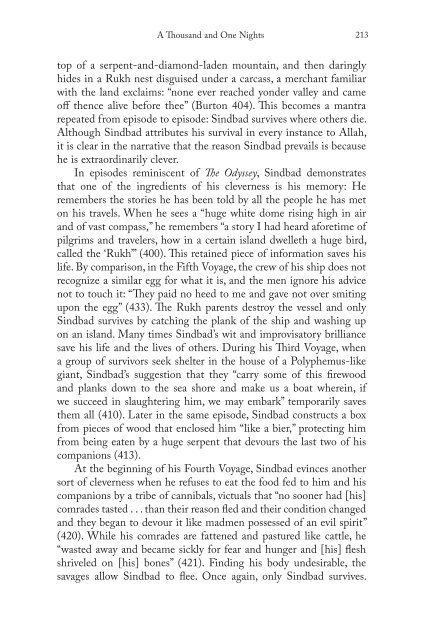Blooms Literary Themes - THE TRICKSTER.pdf - ymerleksi - home
Blooms Literary Themes - THE TRICKSTER.pdf - ymerleksi - home
Blooms Literary Themes - THE TRICKSTER.pdf - ymerleksi - home
You also want an ePaper? Increase the reach of your titles
YUMPU automatically turns print PDFs into web optimized ePapers that Google loves.
A Th ousand and One Nights 213<br />
top of a serpent-and-diamond-laden mountain, and then daringly<br />
hides in a Rukh nest disguised under a carcass, a merchant familiar<br />
with the land exclaims: “none ever reached yonder valley and came<br />
off thence alive before thee” (Burton 404). Th is becomes a mantra<br />
repeated from episode to episode: Sindbad survives where others die.<br />
Although Sindbad attributes his survival in every instance to Allah,<br />
it is clear in the narrative that the reason Sindbad prevails is because<br />
he is extraordinarily clever.<br />
In episodes reminiscent of Th e Odyssey, Sindbad demonstrates<br />
that one of the ingredients of his cleverness is his memory: He<br />
remembers the stories he has been told by all the people he has met<br />
on his travels. When he sees a “huge white dome rising high in air<br />
and of vast compass,” he remembers “a story I had heard aforetime of<br />
pilgrims and travelers, how in a certain island dwelleth a huge bird,<br />
called the ‘Rukh’” (400). Th is retained piece of information saves his<br />
life. By comparison, in the Fifth Voyage, the crew of his ship does not<br />
recognize a similar egg for what it is, and the men ignore his advice<br />
not to touch it: “Th ey paid no heed to me and gave not over smiting<br />
upon the egg” (433). Th e Rukh parents destroy the vessel and only<br />
Sindbad survives by catching the plank of the ship and washing up<br />
on an island. Many times Sindbad’s wit and improvisatory brilliance<br />
save his life and the lives of others. During his Th ird Voyage, when<br />
a group of survivors seek shelter in the house of a Polyphemus-like<br />
giant, Sindbad’s suggestion that they “carry some of this fi rewood<br />
and planks down to the sea shore and make us a boat wherein, if<br />
we succeed in slaughtering him, we may embark” temporarily saves<br />
them all (410). Later in the same episode, Sindbad constructs a box<br />
from pieces of wood that enclosed him “like a bier,” protecting him<br />
from being eaten by a huge serpent that devours the last two of his<br />
companions (413).<br />
At the beginning of his Fourth Voyage, Sindbad evinces another<br />
sort of cleverness when he refuses to eat the food fed to him and his<br />
companions by a tribe of cannibals, victuals that “no sooner had [his]<br />
comrades tasted . . . than their reason fl ed and their condition changed<br />
and they began to devour it like madmen possessed of an evil spirit”<br />
(420). While his comrades are fattened and pastured like cattle, he<br />
“wasted away and became sickly for fear and hunger and [his] fl esh<br />
shriveled on [his] bones” (421). Finding his body undesirable, the<br />
savages allow Sindbad to fl ee. Once again, only Sindbad survives.

















